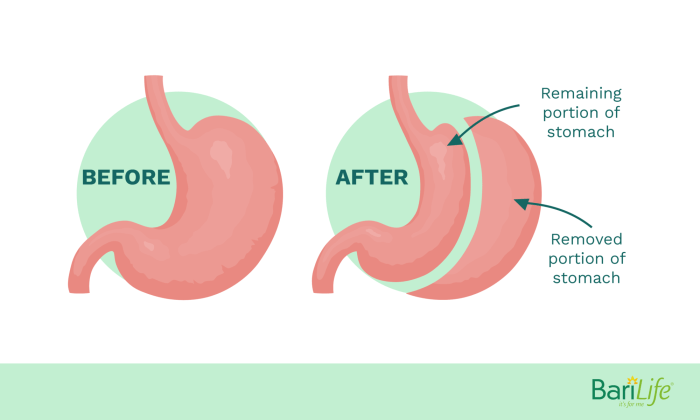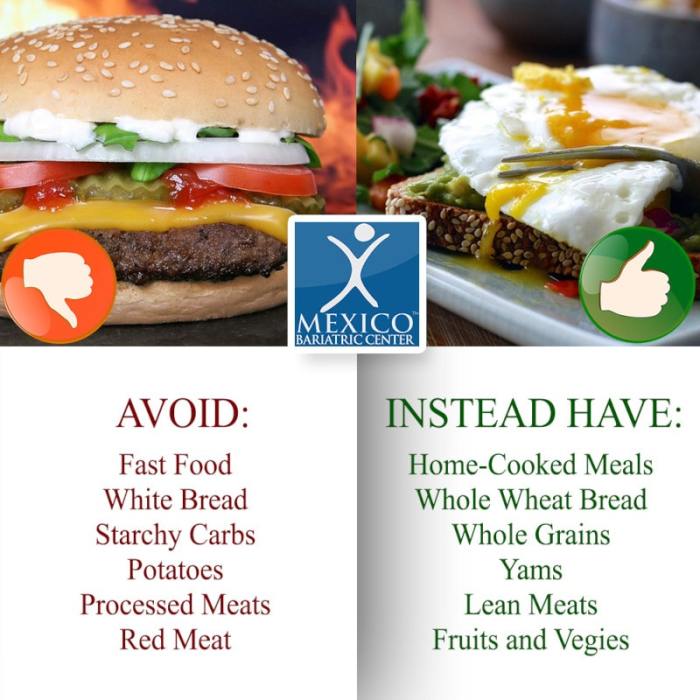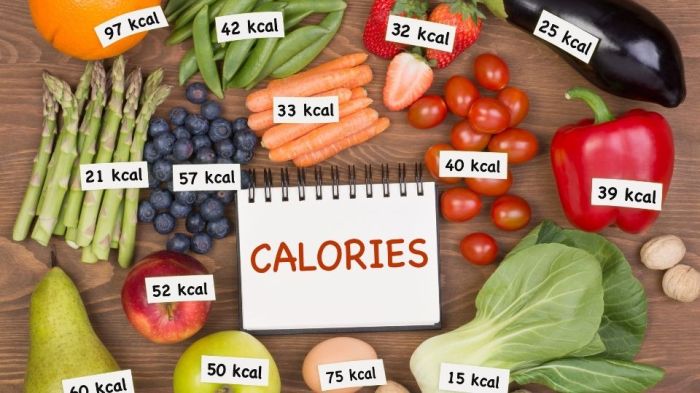How many calories should I eat after gastric sleeve surgery? This question is paramount for individuals seeking guidance on their post-operative nutritional journey. Understanding the specific calorie needs and dietary modifications required after gastric sleeve surgery is crucial for successful weight management and overall well-being.
This comprehensive guide delves into the intricacies of calorie intake, meal planning, and long-term nutrition management following gastric sleeve surgery.
Nutritional Requirements After Gastric Sleeve
Gastric sleeve surgery alters your digestive system, impacting your nutritional needs. Understanding these changes is crucial for optimal recovery and long-term health.
Post-surgery, your stomach capacity is significantly reduced, limiting food intake. This necessitates a focus on nutrient-dense foods to ensure adequate nourishment.
Protein Intake
Protein is essential for tissue repair, muscle maintenance, and satiety. Aim for 60-80 grams of protein daily. Include lean meats, fish, poultry, beans, and protein supplements in your diet.
Hydration
Hydration is paramount. Drink plenty of water throughout the day, especially before and after meals. Avoid sugary drinks and opt for calorie-free beverages like water, herbal teas, or unsweetened coffee.
Calorie Needs
Following gastric sleeve surgery, your calorie needs will vary depending on individual factors such as age, activity level, and weight loss goals. Generally, you will need to consume fewer calories than before surgery to maintain a healthy weight.
Gastric sleeve surgery patients often wonder how many calories they should consume afterward. The answer depends on individual factors, but typically, it’s around 1,000-1,200 calories per day. This is significantly less than the average person’s intake. Incidentally, have you ever wondered how old you have to be to sell eggs ? It’s an interesting question that may have crossed your mind at some point.
Returning to the topic of calorie intake after gastric sleeve surgery, it’s crucial to follow your doctor’s recommendations and gradually increase your intake as you heal.
In the initial stages of recovery, you will likely need to consume around 800-1,000 calories per day. As you heal and progress through your recovery, your calorie needs will gradually increase. Most patients eventually require 1,200-1,500 calories per day to maintain their weight.
As you begin your journey after gastric sleeve surgery, determining the appropriate calorie intake is crucial. While research can provide some guidance, the best approach is to consult with a registered dietitian or healthcare professional. By tailoring your diet to your specific needs, you can ensure optimal recovery and long-term success.
In a similar vein, if you’re considering enhancing your appearance with a tattoo, you may wonder, can you get a tattoo over laser tattoo removal ? Exploring such questions can help you make informed decisions about your health and aesthetics.
Factors Influencing Calorie Needs
- Age:As we age, our metabolism slows down, so older individuals may need fewer calories than younger individuals.
- Activity Level:Active individuals will need more calories than sedentary individuals to maintain their weight.
- Weight Loss Goals:Individuals who are trying to lose weight will need to consume fewer calories than those who are trying to maintain their weight.
Meal Planning
Following gastric sleeve surgery, it’s crucial to adhere to a structured meal plan that aligns with your nutritional needs and calorie intake. This plan should be personalized based on your individual requirements and recovery progress.
Initially, you’ll start with a liquid diet, gradually transitioning to soft foods and eventually regular meals. Meal frequency and portion sizes will vary depending on your tolerance and progress.
Sample Meal Plan
- Breakfast (200-250 calories):Protein shake with fruit or yogurt, or a small portion of oatmeal with berries.
- Mid-morning snack (100-150 calories):A small fruit or a handful of nuts.
- Lunch (250-300 calories):Grilled chicken salad with vegetables, or a small bowl of soup with a lean protein source.
- Afternoon snack (100-150 calories):A small piece of cheese or a Greek yogurt.
- Dinner (300-350 calories):Baked salmon with roasted vegetables, or a small portion of lean ground beef with brown rice.
- Evening snack (100-150 calories):Casein protein shake or a small apple with peanut butter.
Protein Intake
Protein is crucial after gastric sleeve surgery as it supports healing, muscle preservation, and satiety. Aim for 60-80 grams of protein daily to ensure optimal recovery and long-term success.
To incorporate protein into your meals, consider the following tips:
Meal Planning
- Start your day with a protein-rich breakfast, such as eggs, Greek yogurt, or protein shakes.
- Include lean protein sources in every meal, such as chicken, fish, tofu, beans, and lentils.
- Snack on protein-rich foods between meals, such as nuts, seeds, or protein bars.
Hydration
Staying hydrated is paramount after gastric sleeve surgery. Adequate fluid intake promotes overall health, aids digestion, and prevents complications.
To ensure proper hydration, aim to consume approximately 64 ounces of fluids per day. This includes water, clear broths, and unsweetened tea. Consider carrying a water bottle with you to encourage frequent sipping.
Tips for Increasing Fluid Intake
- Set reminders to drink water throughout the day.
- Flavor water with slices of fruit or cucumber to make it more appealing.
- Add electrolyte tablets or powders to water for enhanced hydration.
- Sip on clear broths or unsweetened tea as alternatives to water.
- Avoid sugary drinks and carbonated beverages, as they can dehydrate you.
Nutrient Deficiencies
Gastric sleeve surgery can lead to nutrient deficiencies due to reduced stomach size and altered nutrient absorption. Monitoring and managing these deficiencies are crucial for long-term health.
Common nutrient deficiencies include:
Iron Deficiency
- Iron is essential for red blood cell production.
- Symptoms include fatigue, shortness of breath, and pale skin.
- Monitoring involves blood tests to check iron levels.
- Management includes iron supplements and iron-rich foods (e.g., red meat, leafy greens).
Vitamin B12 Deficiency
- Vitamin B12 is vital for nerve function and blood cell production.
- Symptoms include fatigue, numbness, and tingling in hands and feet.
- Monitoring involves blood tests to check B12 levels.
- Management includes vitamin B12 injections or supplements.
Calcium Deficiency
- Calcium is crucial for bone health and nerve function.
- Symptoms include bone pain, muscle cramps, and osteoporosis.
- Monitoring involves blood tests to check calcium levels.
- Management includes calcium supplements and calcium-rich foods (e.g., dairy products, leafy greens).
Other Deficiencies
- Other potential deficiencies include vitamin D, zinc, and folate.
- Regular blood tests and consultations with healthcare professionals are recommended to monitor and manage these deficiencies.
Long-Term Nutrition Management

Long-term nutritional management after gastric sleeve surgery is crucial for maintaining optimal health and preventing complications. Here’s what you need to know:
Regular Follow-Ups with Healthcare Professionals, How many calories should i eat after gastric sleeve
Regular follow-ups with your doctor, dietitian, and other healthcare professionals are essential. They will monitor your progress, assess your nutritional status, and make necessary adjustments to your diet and supplement plan. These appointments are an opportunity to discuss any concerns or challenges you may be facing.
Sample Table: Calorie and Nutrient Recommendations: How Many Calories Should I Eat After Gastric Sleeve

The following table provides a general guideline for calorie and nutrient intake after gastric sleeve surgery. It is important to note that individual needs may vary, and it is always best to consult with a registered dietitian or other qualified healthcare professional for personalized advice.
The table includes recommended ranges for calories, protein, carbohydrates, and fats. These recommendations are based on the patient’s weight, activity level, and individual goals.
Recommended Calorie and Nutrient Intake
| Nutrient | Recommended Range |
|---|---|
| Calories | 800-1,200 |
| Protein | 60-90 grams |
| Carbohydrates | 100-150 grams |
| Fats | 30-60 grams |
List
Protein is a crucial nutrient for overall health, and it becomes even more important after gastric sleeve surgery. Consuming adequate protein supports wound healing, muscle preservation, and overall recovery.
Here’s a comprehensive list of food sources rich in protein:
Animal-based Protein Sources
- Lean meats: Chicken, turkey, fish, beef, pork
- Dairy products: Milk, yogurt, cheese
- Eggs
Plant-based Protein Sources
- Legumes: Beans, lentils, chickpeas
- Tofu and tempeh
- Nuts and seeds
- Quinoa
Interactive Calculator
Estimating your calorie needs after gastric sleeve surgery can help you achieve optimal results. Use our interactive calculator to get a personalized estimate based on your individual characteristics.
Enter your information in the fields below, and the calculator will provide an estimate of your daily calorie needs.
Fields
- Age (years)
- Height (inches or centimeters)
- Weight (pounds or kilograms)
- Activity level (sedentary, lightly active, moderately active, very active)
Note: This calculator provides an estimate only. Individual calorie needs may vary and should be discussed with a registered dietitian or healthcare professional.
Success Stories and Testimonials

Individuals who have undergone gastric sleeve surgery have experienced remarkable transformations in their nutritional management and overall well-being. Their journeys provide valuable insights and inspiration for others considering or undergoing the procedure.
These testimonials showcase the positive outcomes, challenges, and tips shared by individuals who have successfully navigated their nutritional journey after gastric sleeve surgery.
Determining the appropriate calorie intake after gastric sleeve surgery is crucial for optimal recovery. The specific number of calories depends on factors like activity level and body composition. However, the question of “how old do you need to be to donate eggs” is not directly related to this topic.
If you’re interested in egg donation, here’s a helpful resource . Returning to the topic, consulting with a registered dietitian or healthcare professional is recommended for personalized guidance on calorie intake after gastric sleeve surgery.
Testimonial 1
“After my gastric sleeve surgery, I struggled initially with portion control and meeting my protein goals. However, with the support of a registered dietitian and a structured meal plan, I gradually adjusted to my new eating habits. Now, I feel more in control of my nutrition and have a healthier relationship with food.”
Testimonial 2
“One of the key tips I learned was to focus on protein first. By prioritizing protein in my meals, I felt fuller and more satisfied, which helped me avoid overeating and maintain a healthy weight. Additionally, staying hydrated throughout the day has been crucial for my overall well-being.”
Closing Summary
In conclusion, navigating the nutritional landscape after gastric sleeve surgery requires a tailored approach that considers individual needs and preferences. By adhering to recommended calorie intake, incorporating protein-rich foods, staying hydrated, and seeking regular professional guidance, individuals can optimize their nutritional status and maximize the benefits of gastric sleeve surgery.
Essential FAQs
What is the general calorie range recommended after gastric sleeve surgery?
Typically, calorie intake ranges from 800 to 1,200 calories per day during the early post-operative period.
How often should I eat after gastric sleeve surgery?
It is recommended to eat small, frequent meals throughout the day, aiming for 5-6 meals per day.
What are some tips for incorporating protein into my meals?
Include lean protein sources such as chicken, fish, tofu, beans, and lentils in your meals.
How can I ensure I am staying hydrated?
Carry a water bottle with you and sip on fluids throughout the day. Aim for 6-8 glasses of water daily.
What are some potential nutrient deficiencies to watch out for?
Iron, vitamin B12, and calcium deficiencies are common after gastric sleeve surgery. Regular monitoring and supplementation may be necessary.






